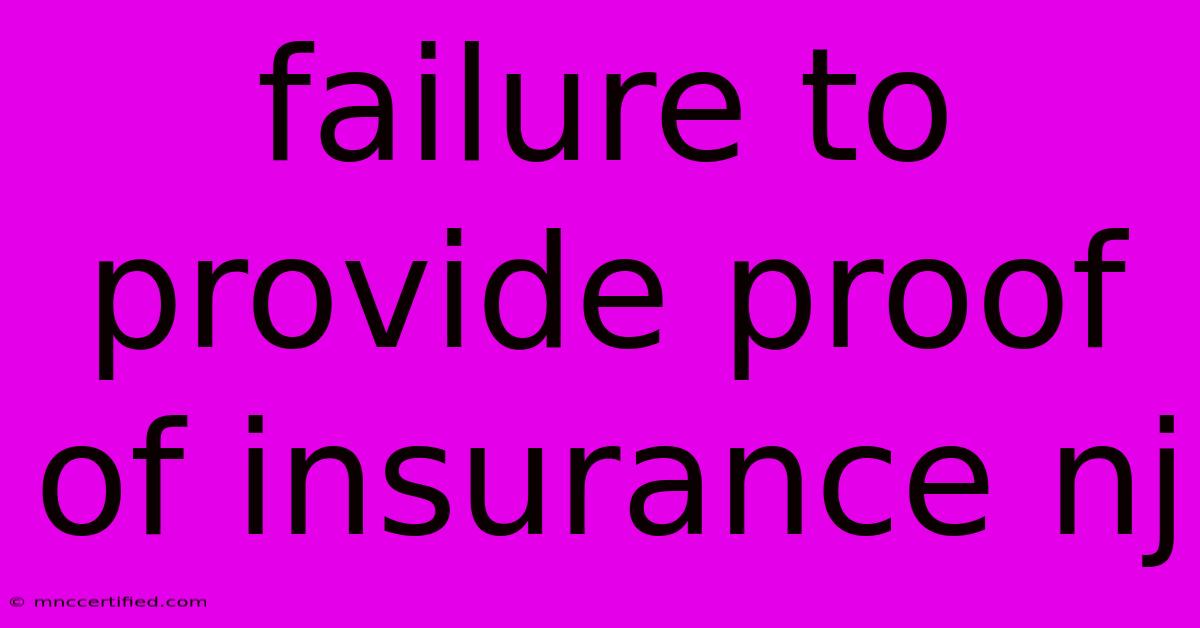Failure To Provide Proof Of Insurance Nj

Table of Contents
Failure to Provide Proof of Insurance in New Jersey: What You Need to Know
Driving without insurance in New Jersey is not only illegal, but it can also lead to serious consequences. If you're caught driving without proof of insurance, you'll face fines, license suspension, and even vehicle impoundment. This article breaks down the legal ramifications of failing to provide proof of insurance in New Jersey, explaining what you need to know to avoid these penalties.
The Importance of Auto Insurance in New Jersey
New Jersey law mandates that all vehicle owners must have at least the minimum amount of liability insurance. This requirement helps protect drivers and passengers from financial hardship in the event of an accident.
Here's why carrying insurance is vital:
- Financial Protection: If you're involved in an accident, your insurance will cover the costs of medical bills, property damage, and legal expenses.
- Legal Compliance: Driving without insurance is a serious offense in New Jersey, and you'll be subject to fines and other penalties.
- Peace of Mind: Knowing you have insurance coverage provides a sense of security and financial stability.
Understanding New Jersey's Proof of Insurance Requirements
New Jersey law requires drivers to carry proof of insurance at all times while operating a vehicle. This proof can be in the form of an insurance card, a digital copy on your phone, or a certificate of insurance.
The following situations can result in a "failure to provide proof of insurance" violation:
- Not carrying a valid insurance card: This is the most common reason for a violation.
- Having expired insurance: Your insurance policy must be current and in effect.
- Providing false or invalid insurance documentation: If the information on your insurance card is incorrect or the policy has been canceled, you'll be considered uninsured.
- Refusing to provide proof of insurance: Police officers have the right to ask for proof of insurance during traffic stops.
Penalties for Failure to Provide Proof of Insurance in NJ
Here's what you can expect if you're caught driving without proof of insurance:
- Fines: First-time offenders will face a fine of $100-$500, with repeat offenders facing higher fines.
- License Suspension: Your driver's license will be suspended for a minimum of 90 days and up to 2 years.
- Vehicle Impoundment: Your vehicle may be impounded until you provide proof of insurance.
- Points on Your Driving Record: These points can increase your insurance premiums in the future.
What to Do If You're Stopped for Not Having Proof of Insurance
Stay calm and be respectful:
- Cooperate with the police officer: Provide your driver's license and registration.
- Explain the situation: If you have insurance but forgot your card, or recently switched insurers, explain the situation clearly.
- Request to obtain proof of insurance: If you have a valid insurance policy but don't have physical proof, ask for time to obtain it.
Avoiding Insurance Violations in New Jersey
- Always carry your insurance card: Keep it in your vehicle at all times.
- Keep your insurance current: Make sure your policy doesn't expire.
- Store your insurance information digitally: Keep a digital copy of your policy on your phone or tablet.
- Review your insurance policy: Understand your coverage and ensure you have the right amount of insurance.
Remember: Driving without insurance is a serious offense in New Jersey. By understanding the laws and taking steps to ensure you're properly insured, you can protect yourself from hefty fines, license suspension, and other consequences.

Thank you for visiting our website wich cover about Failure To Provide Proof Of Insurance Nj. We hope the information provided has been useful to you. Feel free to contact us if you have any questions or need further assistance. See you next time and dont miss to bookmark.
Featured Posts
-
Live Match Manchester United Vs Paok
Nov 08, 2024
-
Is Buying An Apartment A Good Investment
Nov 08, 2024
-
Live Update Uk Interest Rates Drop To 4 75
Nov 08, 2024
-
Cincinnati Insurance Company Naic Number
Nov 08, 2024
-
Del Monte Introduces Natural Ingredient Snack Line
Nov 08, 2024